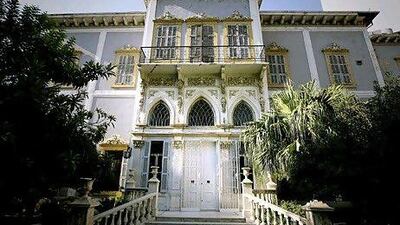I suppose if there is one golden rule in Lebanon it is that nothing must get in the way of business. How else can a country with no common sense of purpose and identity ever hope to get by? But get by it does on a most rudimentary, but nonetheless effective, economic model that involves a lot of buying and selling.
Take land. It is a common enough commodity, but one close to the Lebanese heart. It will be sold reluctantly, normally if there are university fees to pay, property to buy for married children (yes, Lebanese parents can be very generous) or, in extremis, if times are tough.
Land is bought, on the other hand, with security in mind. Buy it and forget about it. The Lebanese trust soil and concrete almost more than they do fixed, long-term interest rates at the bank.
And the biggest rule of all? Don't tell the Lebanese what they can or cannot do with their land. This includes interfering with what they can build on it - hence the odd log cabin in suburbia - and to whom they sell it.
Witness the mild alarm last month when it emerged that Boutros Harb, a lawyer, MP and erstwhile presidential candidate, whose political allegiance lies with the predominantly pro-Western and pro-democracy March 14 alliance formed during the 2005 Cedar Revolution, had proposed a law that would prevent the sale of land between Christians and Muslims for a period of 15 years.
Mr Harb, a Maronite Christian, has had a turbulent five years. He has seen allies and friends killed. It was a period when members of the pro-Syrian March 8 movement, formed in 2005, moved freely about the country and ended only with the May 2008 Doha agreement that brokered a political ceasefire of sorts.
Doha was a signal to the private sector that it could invest with confidence and without the immediate threat of instability or civil conflict.
In Lebanon, one makes hay when the sun shines. That was nearly three years ago. Since then, Lebanon has experienced a property boom to which many words (not least in this column) have been devoted.
During this period, many Shia businessmen, allegedly acting on behalf of Hizbollah, a party that has in effect controlled the country since 2006, have been buying up swathes of land, many of which are in Christian areas and outside the traditional Shia enclaves. Alarmed Christians see the acquisitions as part of Hizbollah's long-term plan to consolidate its grip on the country, and Mr Harb, an MP from the Christian region of Batroun in the north of the country, has stepped in to do his bit. Whether his law will ever be ratified remains to be seen, but it has nonetheless hit a nerve.
Ironically in such a sectarian country, Mr Harb's initiative has struck at the very core of what it means to be Lebanese, a sentiment that appears to override the current concerns about any grand plan Hizbollah may or may not have. The initiative has probably scuppered his hopes of the presidency, a position that is meant to represent all Lebanese.
Lebanon's Sunnis see themselves as urbane, prosperous and sophisticated. Why should they not be able to buy what they like from whom they like?
The Shia will be equally put out. Given the remarkable business network they have built up, not least in Africa, they are arguably Lebanon's most economically vibrant sect.
And yet many will see Mr Harb's initiative, given that it was Shia investors who triggered the alarm in the first place, as a reminder that they are tarred with the brush of Hizbollah.
His proposal has also drawn fire from those who object to what they see as a similar property-buying spree by Gulf Arabs, many from Saudi Arabia, a country with which the prime minister, Saad Hariri, has close ties (he holds Saudi citizenship).
Why, they argue quite reasonably, should Lebanese be allowed to sell to foreigners and not to their compatriots? Naturally, the progressive and secular-minded Lebanese will also feel let down by the proposal.
The independent Shia journalist Hanin Ghaddar, who lives in the predominantly Christian area of Ashrafieh, reminded Mr Harb, in an open letter that under the proposed law she would not be able to bequeath land to her son, a Maronite by virtue of his father's sect.
In Lebanon, religious law forbids A inheriting from B if A is from a different religion. The current way around this dilemma is for B to sell to A at a nominal price. Mr Harb's law, Ms Ghaddar argues, would rule out this option. "My son, simply, would never be able to inherit from me," she said.
On Tuesday, it was announced that the much-vaunted Syrian-Saudi talks to break Lebanon's political deadlock and find away out of the international tribunal imbroglio, had collapsed.
"We are in for a very tense period before the indictments are announced," said a banker friend. "This is not a time to be Christian or Muslim. I am worried. I don't think that we are at a stage when there is a security risk, but I fear for the economy. All it takes is for March 8 to stage another sit-in downtown Beirut and the all the money will leave in an instant."
We sat in silence. "If that happens, it won't matter who is not allowed to sell land because no one will be buying."
Michael Karam is a publishing and communication consultant based in Beirut

